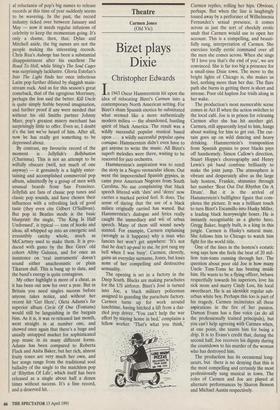Theatre
Carmen Jones (Old Vic)
Bizet plays Dixie
Christopher Edwards
In 1943 Oscar Hammerstein hit upon the idea of relocating Bizet's Carmen into a contemporary North American setting. For Bizet's sham Spanish exotica he substituted what seemed like a more authentically modern milieu — the abandoned, hustling spirit of black America. The result was a wildly successful popular musical based upon . . . a wildly successful popular opera comique. Hammerstein didn't even have to get anyone to write the music. All Bizet's superb melodies were there, waiting to be rescored for jazz orchestra.
Hammerstein's inspiration was to retell the story in a Negro vernacular idiom. Out went the impoverished Spanish gypsies, in came poor American Negroes from South Carolina. No use complaining that black speech littered with `dats' and `deres' now carries a marked period feel. It does. The sense of daring that the use of a black milieu originally carried has waned. But Hammerstein's dialogue and lyrics really caught the immediacy and wit of urban speech. Many of them still sound newly minted. For example, Carmen explaining (wrongly as it happens) why a man who fancies her won't get anywhere: 'It's not that he don't appeal to me, he jest rang my bell when I was busy'. Carmen, cleverly, gains an everyday surname, Jones, but loses none of her compelling and destructive sensuality.
The opening is set in a factory in the Deep South. Blacks are making parachutes for the US airforce. Bizet's Jose is turned Into Joe, a black military policeman assigned to guarding the parachute factory. Carmen turns up for work around lunchtime, having hitched a lift from a daz- zled jeep driver. 'You can't help the war effort by staying home in bed,' complains a fellow worker. 'That's what you think,' Carmen replies, rolling her hips. Obvious, perhaps. But when the line is laughingly tossed away by a performer of Wilhelmenia Fernandez's sexual presence, it comes across as just the sort of cheekily erotic snub that Carmen would use to open her account. This is a compelling, and beauti- fully sung, interpretation of Carmen. She exercises lordly erotic command over all the men she comes across. When she sings `If I love you that's the end of you', we are convinced. She is far too big a presence for a small-time Dixie town. The move to the bright lights of Chicago is, she makes us feel, nothing more than her due. The flare path she burns in getting there is short and intense. Poor old hapless Joe trails along in her wake.
The production's most memorable scene comes in Act II when the action switches to the local café. Joe is in prison for releasing Carmen after she has hit another girl. Carmen, still apparently loyal to him, hangs about waiting for him to get out. The cur- tain goes up on wild dancing and heavy drinking. Hammerstein's transposition from Spanish gypsies to poor blacks pays off handsomely. Simon Callow's direction, Stuart Hopps's choreography and Henry Lewis's pit band combine brilliantly to make the joint jump. The atmosphere is vibrant and desperately alive as the large lady hostess, Frankie, shimmies through her number 'Beat Out Dat Rhythm On A Drum'. But it is the arrival of Hammerstein's bullfighter figure that com- pletes the picture. It was a brilliant touch to turn Bizet's Escamillo into Husky Miller, a leading black heavyweight boxer. He is instantly recognisable as a ghetto hero. Gregg Baker, hugely built, is a king in this jungle. Carmen is Husky's natural mate. She follows him to Chicago to watch him fight for the world title.
One of the lines in the hostess's ecstatic song says how she feels the beat of 20 mil- lion tom-toms running through her. The question about poor old Joe is how many Uncle Tom-Toms he has beating inside him. He wants to be a flying officer, behave respectfully towards his superiors, love his sick mom and marry Cindy Lou, his local sweetheart. He is an identikit regular sub- urban white boy. Perhaps this too is part of his tragedy. Carmen incinerates all these aspirations in the fire of her passion. Damon Evans has a fine voice (as do all the professionally trained principals), but you can't help agreeing with Carmen when, at one point, she taunts him for being a drip. It is to Evans's credit that, during the second half, Joe recovers his dignity during the countdown to his murder of the woman who has destroyed him.
The production has its occasional long- ueurs, but there is no denying that this is the most compelling and certainly the most professionally sung musical in town. The roles of Carmen and Joe are played at alternate performances by Sharon Benson and Michael Austin respectively.


























































 Previous page
Previous page